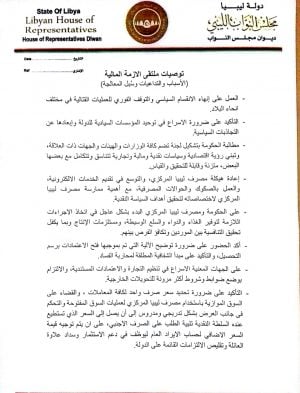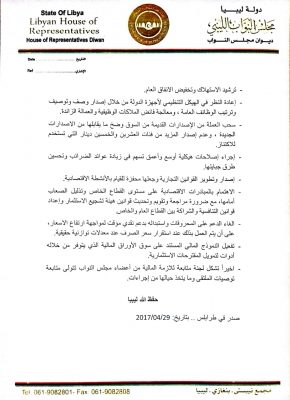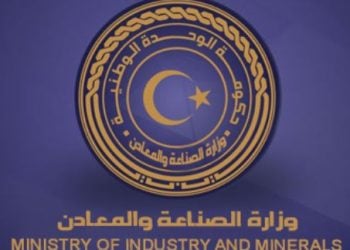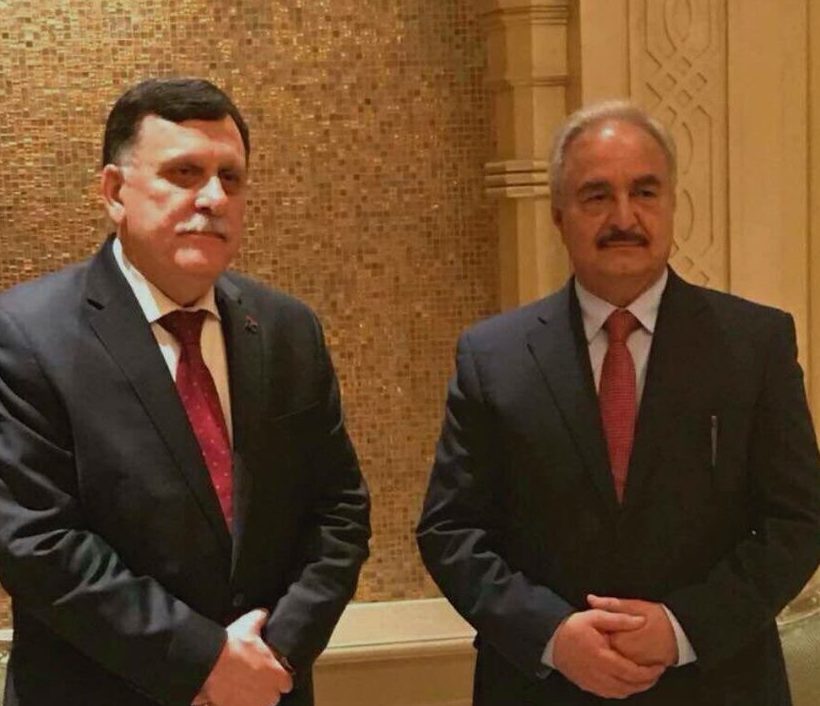By Sami Zaptia.

London, 2 May 2017:
The leading entities concerned with the Libyan economy, including Presidency Council head Faiez Serraj and western-based House of Representatives (HoR) members, met in Tripoli on Monday to find some solutions to the current financial and economic problems the country is going through.
Organizers reported that the meeting included the HoR Finance Committee, the Government of National Accord’s (GNA) Finance, Planning and Economy Ministries, the Tripoli-based Audit Bureau, the Tripoli-based Administrative Control Authority, the Economy Committee in the High State Council, the Economic Development Council and the General Union of Chambers of Commerce and Industry.
Conspicuously, the most important Libyan financial entity that was not present at the meeting, however, was the Central Bank of Libya.
After opening interjections by Faiez Serraj and all of the above, a number of economists and academics were also invited to contribute to the debate under the banner ‘’ The negative effects of the liquidity crisis and the fall in value of the Libyan dinar on the national economy and standard of living on citizens and mechanisms to exit this crisis’’.

At the end of the event the Western-based HoR members released (on HoR headed paper) the following 17-points of recommendations:
- An end to the political division and the immediate termination of fighting in all areas of Libya.
- The confirmation of the need to speed up the unification of sovereign state entities and distancing them from the political infighting.
- A call on the government to form a committee of all the relevant entities to create a complementary political, economic, monetary, financial and commercial vision that is balanced, implementable and measurable.
- The reorganization of the CBL and the expansion in the use of electronic means of payment, cheques and bank transfers and the importance of the CBL practicing its role in order to achieve its monetary policies.
- The government and the CBL should begin urgently to take necessary steps to ensure the availability of food, medicine, intermediary goods, production needs that ensure competitiveness between importers and the equality of opportunity between them.
- A call for the necessity to clarify the mechanism that was used (by the CBL) to open the latest batch of Letters of Credit and Cash Against Documents (foreign currency transfers at the official hugely discounted exchange rate) and ensuring the principle of complete transparency in fighting corruption.
- A call on all relevant entities to speed up the organization of commerce and trade and documentary credit, and a commitment to putting in place more flexible conditions and limits for foreign currency transfers.
- To ensure the unification of the exchange rate for all transactions and putting an end to the black market through the CBL’s use of an open market and through the gradual and studied control of the supply side until the exchange rate reaches a point where demand reaches supply. The additional revenue accrued from the devaluation is to be used by the state in supporting investment and the payment of the (unpaid) Family Allowance and in reducing outstanding state spending.
- A call for a reduction in consumption and in state spending.
- The reform of the state sector entities and their job description and reorganization of state sector jobs and solving the issue of surplus labour and over-employment.
- The withdrawal of old-issue money notes from circulation and replacing it with new issues. Refrain from issuing any more LD 20 and LD 50 notes which are used for hoarding.
- Carryout wide and deep ranging structural reforms that contribute to the increase in tax revenues and improving means of tax recovery.
- The issuing of and improving of commercial trade laws that incentivize commercial activity.
- Paying attention of private sector economic initiatives and reducing difficulties it faces and the necessity for reviewing and modernizing privatization and investment laws and issuing of competition laws and partnership between the public and private sector.
- The ending of fuel subsidies and its replacement with temporary cash subsidies to reduce the effect of price rises after the real stabilization of the foreign exchange rate of the dinar.
- The activation of a financial model based on the stock market that provides mechanisms for financing investment proposals.
- The formation of a committee formed of HoR members to follow-up on the economic crisis and to follow up on these recommendations and the steps taken as a result of this meeting.
It must be pointed out that whilst the Western-based HoR members were responsible for the release of this list of recommendations, it is not clear to what extent it fully reflects in detail the views of Faiez Serraj and his PC. The PC did release a standard press release on their media platforms announcing Serraj’s participation – but it lacked any detailed economic programme of action as the one above.
It must also be noted that the views of the Western-based HoR members do not reflect the views of the leadership or the main body of the HoR in Tobruk. Indeed, Tobruk does not sanction any type of HoR meeting held in Tripoli.
Finally, the big elephant in the room is the conspicuous absence of Saddek Elkaber, the Governor of the Tripoli Central Bank of Libya from the meeting. Elkaber, as the latest Audit Bureau report explains,
https://www.libyaherald.com/2017/05/01/2016-was-the-worse-period-in-libyas-recent-history-audit-bureau-2016-annual-report/
in the absence of a performing legislature as a result of Libya’s political split, seems to be untouchable.
Only the CBL can devalue the Libyan dinar and it is the CBL that has taken it upon itself to decide how much money it loans out to incumbent governments operating on deficits. The CBL has self-appointed itself the guardian of Libya’s fast depleting foreign currency reserves – without any accountability to any other Libyan entity.








